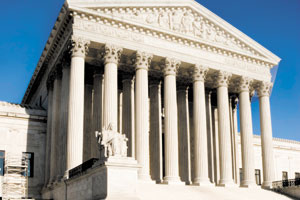 As you may recall, on May 22, 2013, we reported on the Eighth Circuit’s opinion in Nack v. Walburg, Case No. 11-1460 (8th Cir. May 21, 2012), an opinion in which the court raised the specter of constitutionality issues in TCPA class actions. However, the Eighth Circuit ultimately did not decide those key issues, asserting that the defenses raised were challenges to the FCC’s regulations, which must first be raised before the agency pursuant to the Hobbs Act. The full blog post can be found at http://www.workplaceclassaction.com/2013/05/eighth-circuit-raises-specter-of-constitutionality-issues-in-tcpa-class-actions/.
As you may recall, on May 22, 2013, we reported on the Eighth Circuit’s opinion in Nack v. Walburg, Case No. 11-1460 (8th Cir. May 21, 2012), an opinion in which the court raised the specter of constitutionality issues in TCPA class actions. However, the Eighth Circuit ultimately did not decide those key issues, asserting that the defenses raised were challenges to the FCC’s regulations, which must first be raised before the agency pursuant to the Hobbs Act. The full blog post can be found at http://www.workplaceclassaction.com/2013/05/eighth-circuit-raises-specter-of-constitutionality-issues-in-tcpa-class-actions/.
Following the ruling, on October 15, 2013, Defendant Walburg petitioned for a writ of certiorari. See Petition for Writ of Certiorari, October 15, 2013. In his petition, Walburg stated the question presented as “whether the Hobbs Act prohibits a defendant from raising the invalidity of an FCC regulation when that regulation forms the basis of a class action brought by a private party seeking crippling monetary damages. Id at ii. Notably, Walburg cited the circuit split between the Eight Circuit’s interpretation of the Hobbs Act and the Sixth Circuit’s interpretation as stated in Leyse v. Clear Channel Broadcasting, Inc., 697 F.3d 360 (6th Cir. 2012). Id. at i.
Underscoring the importance of this issue, three separate groups filed amicus briefs in this case. The first amicus brief was submitted by two law professors who teach federal procedure and administrative law. See Amicus Brief of Law Professors A. Christopher Bryant and Dru Stevenson. The professors file their brief in support of federal jurisdiction to hear parallel challenges to FCC regulations, namely because: (1) the Hobbs Act was inapplicable; and (2) constitutional issue precluded stripping the federal courts of jurisdiction to hear the dispute. Id. at 3. The second amicus brief, filed by the National Federation of Independent Business Small Business Center, Cato Institute and Center for Constitutional Jurisprudence, reframed the question presented as seeking review under the due process clause to allow judicial review of a challenge to an ultra vires regulation. See Amicus Brief of National Federation of Independent Business Small Business Center, Cato Institute and Center for Constitutional Jurisprudence, pg. v. Finally, Anda, Inc., also a target of TCPA litigation, filed an amicus brief to underscore the practical effects of the 8th Circuit’s ruling, and the “crippling” effect it has on business that submit challenges to the FCC regulations, but where the FCC fails to rule on such challenges. See Amicus Brief of Anda, Inc, pg. 3-5.
Despite these well-reasoned and logically compelling positions, the Supreme Court, on March 24, 2014, denied the petition. See United States Supreme Court Docket No. 13-486.
Walburg still has a petition pending before the FCC, that he filed in August 2013 seeking review of the regulation related to the requirement of opt-out language for facsimiles. See Petition of Walburg before the Federal Communications Commission, dated August 19, 2013. According to Anda’s amicus brief, however, it could be many years before Walburg finds any relief through this forum.
We, as always, will continue to keep watch on these developments and hope some clarification comes soon that provides appropriate relief from the effects of this statute.